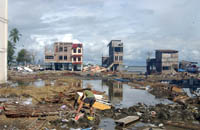World remembers 230,000 victims of Asian tsunami
Thousands of people fled beaches in Indonesia's largest-ever tsunami drill on Tuesday as nations across Asia remembered the moment two years ago when devastating waves crashed into coastlines and killed 230,000 people.

Elsewhere, survivors and mourners visited mass graves, lit candles along beaches, observed a moment of silence and erecting warning towers in hopes of saving lives in the future.
But as Thai authorities prepared to open a cemetery for unidentified tsunami victims, foreign donors alleged that nearly a million dollars intended for DNA sampling and other testing appears to have been misused.
The magnitude 9.0 earthquake that ripped apart the ocean floor off Indonesia's Sumatra island on Dec. 26, 2004 spawned giant waves that fanned out across the Indian Ocean at jetliner speeds, killing people in a dozen countries and leaving millions homeless, the AP says.
Entire villages were swept to sea in Indonesia and Sri Lanka, luxury resorts and fishing communities submerged in Thailand and thousands of homes destroyed in southern India - where commemorations were small and subdued.
A dozen fishermen watched gulls circle overhead in one hard-hit Indian hamlet Tuesday, staring at the sea and telling stories about villagers who died. Hundreds more gathered as the day went on, some throwing flowers into the water as others lit camphor sticks.
"I cannot forget the events of two years ago, it feels like they happened just yesterday," said Zaldi Setiawan in the worst-hit region of Aceh on Indonesia's Sumatra island.
Like scores of other Acehnese, he prayed Tuesday at mass graves where tens of thousands of people were buried in the days after the disaster, remembering his two children that were ripped from his hands by the waves.
"I can still imagine their faces," he said.
The drill on Indonesia's resort island of Bali - which involved real-time warnings sent from the capital to radios along the beach - was as much about raising awareness as testing technology deployed in the country hardest hit two years ago.
Nearly 167,000 of those killed were from Aceh province - hundreds of kilometers (miles) west of Bali - where tens of thousands of people still live in temporary homes.
Sirens wailed as crowds, many of them school children, briskly walked inland from the shore, accompanied by Indonesia's minister of research and technology and a handful of foreign tourists.
"The biggest challenge is working with the people to make them aware," said German geologist Harald Spahn, who is helping Indonesia set up its alert network. "It is a really complex job that many people underestimate."
In Thailand, ceremonies were being held along the Andaman coast with Buddhist prayers to remember more than 8,200 killed, many of them foreign holiday makers. Balloons will be launched and candles lit along beaches once again filled with sun-seeking foreign tourists.
Dorothy Wilkinson, a 38-year-old from Surrey, England, still has a hard time going near the ocean and cries when talking about her fiance, who was killed in the tsunami along with his parents.
But like scores of other survivors, she felt it was important to return for the anniversary.
"This is a time to remember those people who lost," she said, adding "I don't want to spend Christmas at home. It is too lonely."
In Sri Lanka, the resurgence of a civil war has added to the misery of survivors and slowed efforts to rebuild - sparking criticism from outgoing U.N. Secretary-General Kofi Annan, who urged Tamil Tiger rebels and the military to lay down their arms.
"No one could have prevented the tsunami's wave of destruction," he wrote in a statement. "But together, we can stem the tide of conflict, which threatens once again to engulf the people of Sri Lanka."
Temple bells chimed to mark the exact time the first wave crashed ashore, and all cars and trucks came to a standstill for two minutes. Looking to the future, the first of 100 warning towers was erected on a beach.
In India, where another 18,000 are believe to have died, interfaith ceremonies were being be held and in Malaysia, where 69 people were killed, volunteers were replanting mangroves.
The 2004 tsunami generated an unprecedented outpouring of generosity, with donor pledges reaching some US$13.6 billion (€10.31 billion), but many of those homeless complain they are stuck with poorly built structures that leak, are termite-infested or located in flood zone
Corruption has also marred the process, with several nongovernment organizations forced to delay projects or rebuild homes after contractors and suppliers ran off with the funds.
Thailand faced fresh questions about possible graft on Tuesday.
Seven Western nations sent a letter to Thai police saying up to 60 percent of the US$1.6 million set aside to help identify the dead in that nation appears to have been misused.
The money may have gone toward travel and other miscellaneous costs, an unnamed U.S. diplomat was quoted as saying in the English-language daily, The Nation, calling for an investigation.
Subscribe to Pravda.Ru Telegram channel, Facebook, RSS!




